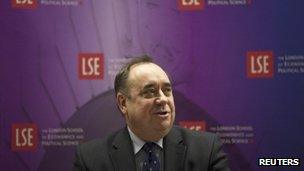Scottish independence: Oil fund 'could be worth £30bn'
- Published

The first minister has been outlining his vision for a Scottish oil and gas fund
Scotland's first minister has revealed plans for an independent Scotland to establish an ''oil fund'' to help future generations.
Alex Salmond said that earmarking about a tenth of oil and gas tax revenues - about £1bn a year - could lead to a £30bn fund over a generation.
The plans are based on a scheme operated by the Norwegian government.
Labour said the idea was 30 years out of date and the Lib Dems said economic influence would drop outside of the UK.
Mr Salmond said currently the UK was the only oil producing country not operating an oil fund scheme.
He told the BBC: "The only finance department that hasn't done it really as a major oil and gas producer is the United Kingdom Treasury.
"If you look at every other, just about every other, major oil producing country - whether it's Abu Dhabi, Norway, or the states of Canada - all of them have built up an investment fund for the future of their state or the future of their country.
"Westminster is the exception in this regard and I think most people looking at the management of oil and gas resources would rather follow the Norwegian example than follow the example of the Treasury in London."
Mr Salmond was speaking ahead of a lecture at the London School of Economics, where he outlined his ambition to use the energy economy to create multi-billion pound wealth for an independent Scotland.
He told the gathering of academics, students and members of the public: "Under independence we would make the best use of our unparalleled energy resources.
"We have 25% of Europe's tidal power potential, 25% of its offshore wind potential and 10% of its wave power potential - not bad for a nation with less than 1% of Europe's population."
'Volatile commodity'
Scottish Labour's Ken Macintosh said the only certainty about oil was that it would run out.
Mr Macintosh said: "If Scotland started an oil fund in the same year as Norway, the current balance would be zero because we spend more on public services than raise in tax."
He added: "The SNP's argument about what did and didn't happen 30 years ago doesn't speak to the reality of the choice today.
"Basing our entire economy on a single commodity that is volatile in price and finite in supply is a step backwards for Scotland."
Scottish Lib Dem leader Willie Rennie said Scotland's global economic impact came as being a strong part of the UK.
He added: "Far from giving Scotland more influence over the global economy, splitting Scotland from the UK would give us less."
The first minister is due to meet with Prime Minister David Cameron for talks in Edinburgh on Thursday.
The Scottish government has signalled its intention to hold a vote in the autumn of 2014, while the UK government has called for an earlier poll.
There are also disagreements over the wording of a question, the temporary transfer of legal powers to hold a referendum and whether a second question could be included on increased powers for the Scottish Parliament.